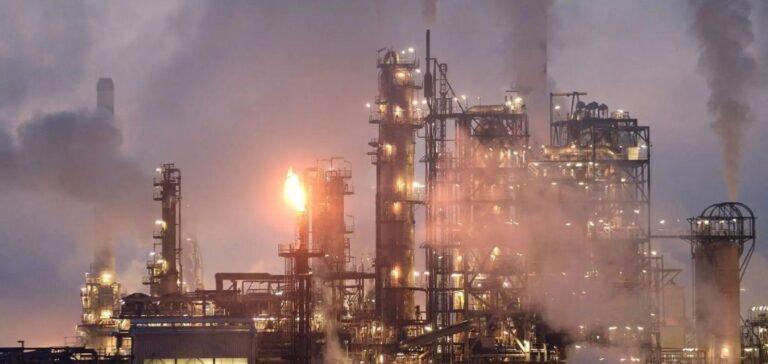The world’s major oil and gas companies are far from making the necessary efforts to limit global warming, and have in some cases backtracked on their commitments, according to a report by Carbon Tracker on Thursday, which nevertheless rates European groups higher.
Stagnation in Oil & Gas Companies’ Climate Commitments: Carbon Tracker Report
“Progress by oil and gas companies to strengthen their emissions commitments has stalled, with most remaining in the same range as last year,” stresses think-tank Carbon Tracker, in a statement.
The 36-page annual report, Absolute impact 2023, aimed at investors in particular, takes stock of the climate ambitions of the 25 biggest oil & gas companies, including state-owned companies. A sector that will come under intense scrutiny at COP28 in Dubai at the end of the year. The United Nations Climate Change Conference, where a tough battle over the end of fossil fuels is shaping up, is supposed to put the world back on track with the Paris Agreement: to limit global warming to well below 2°C, and if possible to 1.5°C, compared with the pre-industrial era.
However, the report finds that many corporate climate plans rely on methods that have not been proven on a large scale, such as carbon capture and storage, and carbon offsetting. He also notes that “some companies are backtracking on their commitments”, such as BP, which has lowered its 2030 target for a reduction in hydrocarbon production from 40% to 25%. And Shell, which announced that its oil production would remain stable until 2030.
“Our analysis shows that the world’s largest oil and gas companies continue to put investors at risk by failing to plan (hydrocarbon) production cuts in line with the Paris target of 1.5 degrees,” commented Mike Coffin, co-author of the report.
Oil and gas company rankings: Eni in first place, TotalEnergies in second
Of the 25 companies, “only” Italy’s Eni has targets “potentially” in line with the Paris target, according to the think tank. TotalEnergies is ranked second. But while Eni has topped the rankings for the 4th year running, the credibility of its targets may be called into question “given that they depend on asset sales, as well as unproven carbon capture and storage technologies and carbon offsets”, points out Carbon Tracker.
“The big European companies top the ranking, with systematically more ambitious targets than their North American rivals, while the lowest commitments were made by ExxonMobil and five predominantly state-owned oil companies: Aramco, Brazil’s Petrobras and China’s Sinopec, PetroChina and CNOOC,” summarizes Carbon Tracker in its presentation.
Behind Eni comes TotalEnergies, which has taken over from Repsol, now ranked 3rd, ahead of BP and Shell. Regarded as “more progressive” than their competitors, TotalEnergies, Repsol and BP all have declared targets of “carbon neutrality” by 2050 and intermediate targets by 2030 “but their targets exclude emissions from certain key activities”, notes Carbon Tracker.
Saudi Aramco Latest in Oil & Gas Climate Commitments
Some 16 companies, including ExxonMobil and Conoco, have targets covering only their operational emissions, i.e. not the emissions generated by the combustion of the oil and gas their customers buy, which account for around 90% of their true carbon footprint. Companies like Shell and Equinor have very distant targets, for 2050, “but no absolute intermediate targets”, which is nevertheless considered an indispensable step.
In last place, Saudi Arabia’s Aramco, “is the only company to limit its emissions reduction targets to the assets it wholly owns and operates”, points out Carbon Tracker, not to mention the fact that it only sets a reduction target in relation to a future growth trajectory, which de facto reduces its efforts.
Why does it matter?
Carbon Tracker’s report highlights the importance of closely monitoring the climate commitments of major oil and gas companies, particularly in the context of the global fight against global warming. These companies play a key role in the energy transition, and their actions have a significant impact on financial markets, the global economy and the future of our planet. Investors, policy-makers and the public need to be informed about companies’ real efforts to reduce their carbon footprint, in order to make informed decisions and promote effective climate action.






















